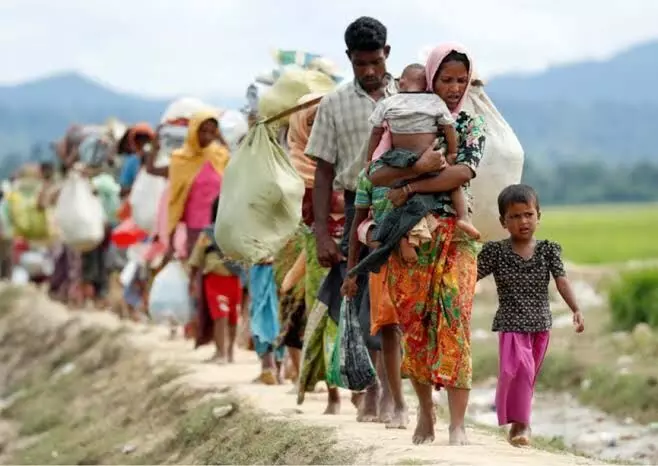Politics, Humanity, and the Rohingya Crisis: India’s Lost Moral Compass
The Rohingya refugee crisis has become a political football in India. This article explores the government's inconsistent approach, the human cost, and the urgent need for a comprehensive refugee policy.;

The Rohingya refugee crisis has, once again, become a flashpoint in Indian politics. The recent clash between the Aam Aadmi Party (AAP) and the Bharatiya Janata Party (BJP) over Rohingyas in Delhi exposes a deeper, systemic issue—India’s lack of a clear refugee policy. What could have been a meaningful debate about handling refugees has instead descended into a blame game.
Delhi’s Chief Minister Atishi recently accused the Centre of settling Rohingyas in the capital without consulting the Delhi government. She cited Union Minister Hardeep Singh Puri’s 2022 social media post, where he suggested that Rohingyas would be moved into EWS flats in Delhi’s Bakkarwala. The Centre swiftly countered, accusing AAP of offering support—electricity, water, and even compensation—to illegal Rohingya settlements. Lost in these allegations and counter-allegations, however, is the hard reality of the Rohingyas’ plight and India’s inconsistent approach to refugee management.
The Rohingyas are one of the most persecuted minorities in the world. Fleeing Myanmar after a brutal military crackdown in 2017, they sought refuge across South Asia, with Bangladesh alone hosting over a million refugees. India, by comparison, houses only about 40,000 Rohingyas.
Yet, their presence has been repeatedly politicized, with the Centre often framing them as illegal immigrants and security threats. This characterization is not only misleading but also dangerous.
The BJP’s position on the Rohingyas has been contradictory. India has a long history of sheltering persecuted groups—Tibetan exiles, Afghan refugees, and Sri Lankan Tamils, to name a few. Leaders like Hardeep Singh Puri have, at times, echoed this legacy, emphasizing India’s responsibility to provide refuge.
However, when it comes to the Rohingyas, the rhetoric changes. In 2017, the Centre announced plans to deport Rohingyas, claiming—without concrete evidence—that they posed a security risk. Subsequent clarifications on policies, such as the Bakkarwala housing controversy, have only added to the confusion.
The heart of the problem lies in the absence of a legal framework for refugees in India. India is not a signatory to the 1951 UN Refugee Convention or its 1967 Protocol, which outline rights for refugees and responsibilities for host nations. This allows the Indian government to treat refugees as it sees fit—sometimes with compassion, often with hostility.
Rohingyas fall into this policy vacuum, living precarious lives without legal recognition or protections. By conflating refugees with illegal migrants, the Centre skirts its humanitarian responsibilities while stoking communal anxieties.
The recent political tussle between AAP and the BJP is symptomatic of this larger policy failure. Atishi’s take—that the Centre settled Rohingyas in Delhi without consultation—raises valid concerns about transparency and accountability. However, the BJP’s response, accusing AAP of “hosting” Rohingyas and enabling settlements, reveals a troubling strategy.
Instead of addressing the issue constructively, the Centre has chosen to weaponize it for electoral gains. By painting Rohingyas as a burden supported by opposition-led state governments, the BJP fuels a divisive narrative that serves political ends while neglecting human lives.
The “security risk” argument, often used to justify anti-Rohingya rhetoric, requires closer scrutiny. Concerns about terrorism cannot be dismissed outright, but it is disingenuous to brand an entire community as a threat. Rohingyas are fleeing persecution, not seeking conflict. The Centre’s failure to substantiate claims linking Rohingyas to terror activities further weakens this argument. In reality, refugees face far greater threats of exploitation, trafficking, and poverty than they pose to national security.
Amidst this political bickering, the Rohingyas remain trapped in dire conditions. Living in informal settlements, they lack access to basic amenities, education, and employment. Without official refugee status, they are excluded from most government programs.
The Centre’s hardline stance only exacerbates their suffering, denying them dignity and protection. Instead of addressing these challenges, both the Centre and opposition parties have used the Rohingyas as convenient scapegoats.
The solution to this crisis lies not in blame games but in meaningful policy reform. India must adopt a national refugee law to provide legal clarity and humane protections for those seeking asylum. A clear distinction between refugees and illegal migrants would allow the government to address security concerns without undermining human rights. Such a framework would also prevent refugees from becoming political tools, ensuring that their lives are governed by law, not ideology.
Additionally, the Centre must work with state governments to manage existing refugee settlements. Rohingya communities have emerged in cities like Delhi not because of government decisions but due to administrative neglect. Coordinated efforts are needed to ensure basic services and safety for refugees, rather than leaving them in limbo or vilifying them for political gain. India must also engage with international agencies like the UNHCR to manage resources and support refugee communities effectively.
India’s moral standing on the global stage depends on how it treats the most vulnerable. The vilification of Rohingyas undermines our historical legacy of compassion and inclusivity. By turning refugees into a political issue, we risk eroding values that define us as a nation. This is not just about the Rohingyas—it is about India’s commitment to justice, humanity, and accountability.
The current crisis reflects more than just policy failures; it reflects a loss of moral direction. For too long, the Rohingyas have been treated as pawns in political battles. It is time for the Centre to rise above ideological divides and acknowledge its responsibility. The answer lies not in scapegoating or blame-shifting but in compassionate, decisive action.
If India truly aspires to be a global leader, it cannot abandon those seeking refuge on its soil. The Rohingyas deserve dignity, safety, and recognition—not as threats, but as survivors of unimaginable persecution. The question now is whether our leaders have the courage to put humanity above politics.

